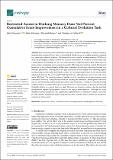Restricted access to working memory does not prevent cumulative score improvement in a cultural evolution task
Abstract
Some theories propose that human cumulative culture is dependent on explicit, system-2, metacognitive processes. To test this, we investigated whether access to working memory is required for cumulative cultural evolution. We restricted access to adults’ working-memory (WM) via a dual-task paradigm, to assess whether this reduced performance in a cultural evolution task, and a metacognitive monitoring task. In total, 247 participants completed either a grid search task or a metacognitive monitoring task in conjunction with a WM task and a matched control. Participants’ behaviour in the grid search task was then used to simulate the outcome of iterating the task over multiple generations. Participants in the grid search task scored higher after observing higherscoring examples, but could only beat the scores of low-scoring example trials. Scores did not differ significantly between the control and WM distractor blocks, although more errors were made when under WM load. The simulation showed similar levels of cumulative score improvement across conditions. However, scores plateaued without reaching the maximum. Metacognitive efficiency was low in both blocks, with no indication of dual-task interference. Overall, we found that taxing working-memory resources did not prevent cumulative score improvement on this task, but impeded it slightly relative to a control distractor task. However, we found no evidence that the dual-task manipulation impacted participants’ ability to use explicit metacognition. Although we found minimal evidence in support of the explicit metacognition theory of cumulative culture, our results provide valuable insights into empirical approaches that could be used to further test predictions arising from this account. © 2022 by the authors. Licensee MDPI, Basel, Switzerland.
Citation
Dunstone , J , Atkinson , M , Renner , E & Caldwell , C A 2022 , ' Restricted access to working memory does not prevent cumulative score improvement in a cultural evolution task ' , Entropy , vol. 24 , no. 3 , 325 . https://doi.org/10.3390/e24030325
Publication
Entropy
Status
Peer reviewed
ISSN
1099-4300Type
Journal article
Description
This project has received funding from the European Research Council (ERC) under the European Union’s Horizon 2020 research and innovation programme under grant agreement No. 648841 RATCHETCOG ERC-2014-CoG.Collections
Items in the St Andrews Research Repository are protected by copyright, with all rights reserved, unless otherwise indicated.

